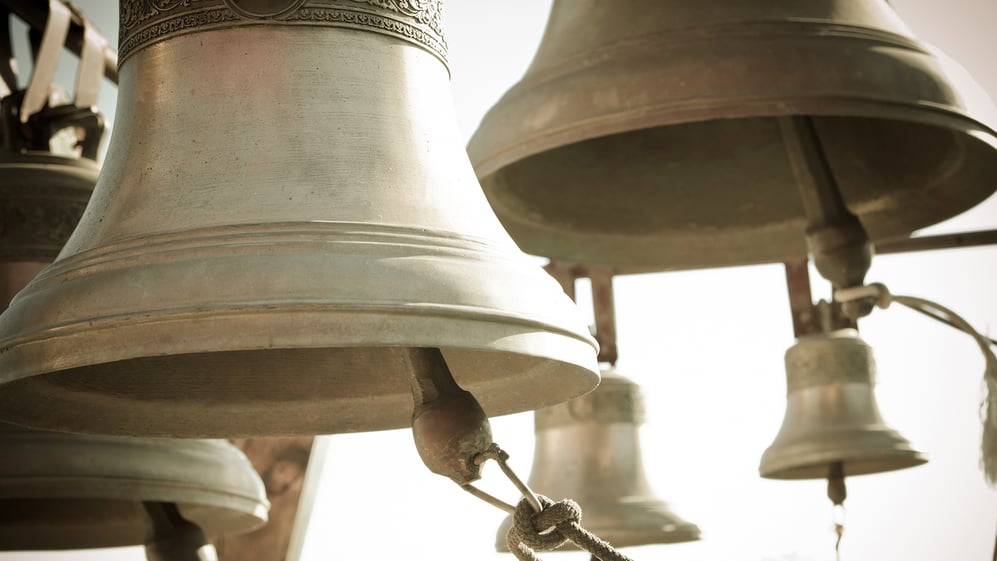Crumbled have spires in ev’ry land;
Bells still are chiming and calling,
Calling the young and old to rest,
But above all the souls distressed,
Longing for rest everlasting. (LSB 645:1)
Directly outside the main entrance to our church sits a squat, square brick structure, the last remnant of what I’m told was once our church’s bell tower. As I recall, some weather catastrophe compromised the tower, and the church bells no longer ring out.
Frankly, I wish we still had that bell tower. There’s a certain charm to church bells, a certain quality that, at least in much of the United States, we don’t experience anymore. I haven’t seen much of Europe, but my husband tells me church bells regularly ring out there. I’m not about to tell you that Europeans must be more committed to their churches to still cultivate the art of church bell ringing. Instead, I assume ringing church bells are simply part of the culture in many parts of Europe, a continent with churches much older than those of the United States, in a way they are not in our own country.
Do You Hear Church Bells?
But why not? Why do we not hear the ringing of church bells? Perhaps you do. Perhaps you live near a church whose bells regularly ring out. Perhaps your own church’s bells are in constant use. I remember hearing the bells of my own church ring out when I was younger. I remember playing at recess and humming along to the hymns the bells would play. I imagine one reason for a lack of church bells today stems from the inconvenience the noise causes the neighbors.
But I have a somewhat romantic longing for a church with bells that regularly peal. There’s something charming about the whole situation. I imagine telling the time using such peals. I imagine hurrying in from the street when I hear the bells ringing, a ringing that ushers the people into the church for the service.
The excerpt of the stanza above encapsulates the ideal use of church bells: calling people to rest. The church bells mentioned in “Built on the Rock” are not literal bells; nonetheless, the hymn assumes that church bells are not annoying and loud inconveniences to an otherwise quiet neighborhood. Rather, they are calling the people to find rest—true, eternal rest.
Therein lies their charm. Not merely their music itself, but the thing to which the music points. The sound of church bells is a summons to hear the Word of God and to receive His body and blood in Holy Communion. It is a summons into a holy building, a place to gather in reverence, a place to rest. And a place that is truly restful because it it is a place we hear of Him who provides rest, Jesus Christ Himself. This rest is lasting and is not swayed by the harried world and its constant turmoil. Rather, it is a rest ending in heaven, the place of true, eternal rest.
The Message of Church Bells
Church bells, like every part of the church building, should convey the reason the building exists. We are, after all, only humans, and we need tangible and aural reminders of things unseen. It’s why Jesus instituted the Eucharist. It’s why we baptize with water. It’s why the Word was made flesh. It’s why Thomas put his hands into the marks left on Jesus’ body by the crucifixion. The bells summon us with their peals. They claim our attention and call us to enter the building where we hear the Gospel proclaimed and our sins forgiven.
In the end, though, the point of the hymn “Built on the Rock” is that God does not need a building to do His work. Even if all churches crumbled into heaps of rubble, the Gospel would still be proclaimed and God would still dwell with His people. And this is the joy of church bells. Their pealing invites us to a building that tells us with every wall and window that it, in the end, is inconsequential. It is not a proud and pompous skyscraper making its mark on modernity. It is, rather, a structure advertising its own defeat. Like the bell tower at my church, all church structures will eventually crumble and fall, and we know it. Because, in the end, the bells call us to Christ, not to the buildings here on earth. Christ will provide an eternal structure for us in heaven.
Perhaps the fallen bell tower at my church speaks just as loudly as all tall-standing bell towers and all loud-ringing church bells. For it is a very manifestation of the same thing church bells summon the people to hear: this building will not last, this world will not last. But the Word of the Lord will endure forever, the Word that tells us that we will live with Christ forever in perfect peace and rest.
Grant, then, O God, Your will be done,
That, when the church bells are ringing,
Many in saving faith may come
Where Christ His message is bringing:
“I know My own; My own know Me.
You, not the world, My face shall see.
My peace I leave with you. Amen.” (LSB 645:5)
Perform “Built on the Rock” with John A. Behnke's full score arrangement.













